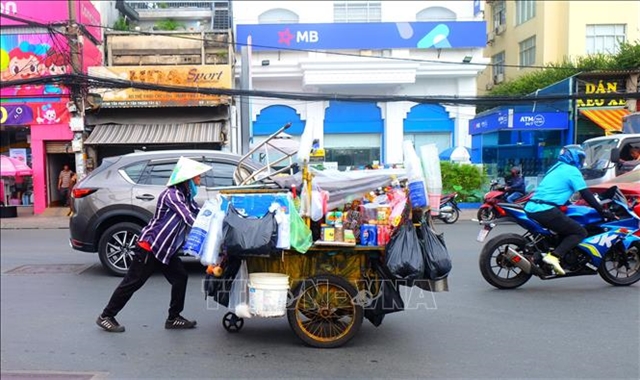 Opinion
Opinion

 |
| A street food cart in HCM City. — VNS Photo |
HCM CITY — HCM City has recently recorded multiple cases of food poisoning, causing dozens of students to be hospitalised and raising concerns about food safety during the hot season.
As the heat has begun to intensify, carts and street vendors crowd school gates or spill over onto the streets, posing challenges to street food management.
Nguyễn Văn Quyên, a street vendor near a school on D8 Street in Phú Mỹ Ward, District 7, said to save money, he often buys ingredients at the market and processes them the night before, or early in the morning.
Similarly, Huỳnh Ngọc Hoa, who sells fried balls at the school gate in Tân Bình District, said: “I buy ingredients from local markets near my house. As for whether or not this food has a traceable origin, or how it is traceable, I am not very familiar with it.”
Nguyễn Thị Thanh Kiển, a parent of a student at a school in District 3, said that normally, she still wakes up early to prepare breakfast, ensuring the health of the whole family. However, on busy days, or when she wants to change the menu, she still allows her children to buy their own breakfast outside of their school.
Although she allows her children to buy things to eat outside of school, she still worries about the quality of these foods.
The general mind set of many parents is that they are not really assured about the quality of food sold around schools, especially as many students have suffered from food poisoned, vomiting, and diarrhoea after eating things they have bought at the school gates.
To minimise the risk of contaminated food entering the school, school boards and teachers remind students to limit the consumption of food of unknown origin, but it is difficult to have sanctions to thoroughly manage all street vendors.
Street vendors work everywhere, especially in inner-city districts, export processing zones, industrial parks or densely populated areas in the city.
Trần Ngọc Thúy, an office worker in District 4, said that because she lives alone and is reluctant to cook in the morning, she often prioritises pre-prepared, easy-to-buy and easy-to-carry dishes on the way to work.
According to experts, because of convenience for consumers, these mobile eateries are becoming more and more popular and familiar to people in busy urban areas. The positive side of this type of business is that it brings convenience to everyone, but it also has many potential risks in terms of food safety.
As the city enters the hot season, ensuring safety from the processing, preservation and storage stages, through to the delivery of food to consumers is a major concern not only for consumers, but also for state management agencies.
According to Nguyễn Thị Lam Phương, from the city's Department of Food Safety, the hot season is the time when food is easily spoiled, especially street food sold by vendors around school gates. These street vendors are mobile, easily moving from one location to another, and are difficult to control and trace. Not only do they not ensure quality under the hot sun, but also pose a risk of infection when stopping, parking and selling in unsanitary places.
To ensure the health of consumers, especially students, after many recent food poisoning cases, specialised forces in Thủ Đức City and districts of the city have regularly organised inspections at places with many mobile eateries and densely populated residential areas to promptly correct encroachment on pavements or doing business in inappropriate areas.
These forces also actively encourage businesses to wear gloves, masks and use food storage cabinets to limit the risk of bacterial contamination when delivering food to consumers.
Over the long term, the Department of Food Safety will continue to implement food monitoring programmes in raw material areas, take samples to monitor goods at markets and promote food traceability programmes at wholesale markets.
In addition, the department will also promote and encourage street vendors to use food with clear origins and preservation methods, and strictly handle violations to prevent unsafe food from entering the market. — VNS




